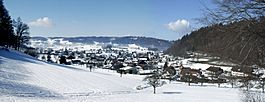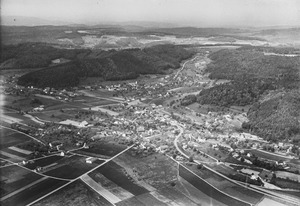Kirchleerau facts for kids
Quick facts for kids
Kirchleerau
|
||
|---|---|---|
 |
||
|
||
| Country | Switzerland | |
| Canton | Aargau | |
| District | Zofingen | |
| Area | ||
| • Total | 4.36 km2 (1.68 sq mi) | |
| Elevation | 512 m (1,680 ft) | |
| Population
(Dec 2020 )
|
||
| • Total | 898 | |
| • Density | 206.0/km2 (533.4/sq mi) | |
| Postal code |
5054
|
|
| Surrounded by | Moosleerau, Schlossrued, Schmiedrued, Staffelbach | |
Kirchleerau is a small town, also called a municipality, in Switzerland. It is located in the Zofingen area within the canton of Aargau.
Contents
History of Kirchleerau
Kirchleerau was first mentioned way back in 1248. Its old name was Lerowe. People have lived here for a very long time. We know this because old Roman bricks and wall pieces have been found.
The name Kylchleren appeared in 1306. This name comes from an old German word meaning "by the land of graves near the water."
In the Middle Ages, powerful families ruled the village. First, it was the Counts of Lenzburg. Then, the Counts of Kyburg took over. After them, the Habsburg family gained control in 1273. They were very important rulers in Europe.
In 1415, a group called the Confederates took over Aargau. Kirchleerau then became part of the land controlled by the city of Bern. This area was known as Bernese Aargau.
From the 1400s, the village was part of the Lordship of Rued. This was a special area with its own local laws. The owners of this lordship were very important landowners. In 1520, the Lords of May, who came from Italy, bought the manor. Their home was Rued Castle nearby.
In 1528, Bern introduced the Reformation. This was a big change in religion. It meant people in Kirchleerau became Protestant.
In March 1798, French soldiers invaded Switzerland. They ended Bern's power. They created a new country called the Helvetic Republic. Since then, Kirchleerau has been part of the canton of Aargau. The May family sold their last rights to the canton in 1834.
For a long time, farming was the main way people lived in Kirchleerau. But since the 1960s, more houses have been built. This has made the population grow a lot.
Geography of Kirchleerau
Kirchleerau covers an area of about 4.36 square kilometers (1.68 square miles). This was measured in 2009.
Here's how the land is used:
- About 41.5% is used for farming. This includes fields for crops and areas for animals to graze.
- About 50.0% is covered by forests. These are mostly thick, natural forests.
- About 8.5% has buildings or roads. This is where people live and move around.
The town is located in the Zofingen district. It sits in a valley that branches off from the Suhre river valley.
Coat of Arms
The coat of arms for Kirchleerau is very special. It shows a silver church with red roofs on a green base. The background is blue.
The word for church in German is Kirche. This is why the coat of arms has a church on it. It's a clever way to show the town's name, which is called canting arms.
People of Kirchleerau
Kirchleerau has a population of 784 people. This number can change over time. In June 2009, about 6.4% of the people living here were from other countries.
Most people in Kirchleerau speak German. This was true in 2000, with 97.3% speaking German. A small number of people also speak Serbo-Croatian or French.
In 2008, here's how old the people in Kirchleerau were:
- Children (0-9 years old): 8.6%
- Teenagers (10-19 years old): 9.9%
- Young adults (20-29 years old): 11.0%
- Adults (30-39 years old): 15.7%
- Adults (40-49 years old): 17.4%
- Adults (50-59 years old): 15.3%
- Seniors (60-69 years old): 11.4%
- Seniors (70-79 years old): 6.6%
- Seniors (80-89 years old): 3.8%
- Seniors (90 and older): 0.4%
Most homes in Kirchleerau are owned by the people who live in them. In 2000, about 63% of homes were owner-occupied. This means people didn't pay rent.
In 2008, there were 317 homes and apartments in Kirchleerau. More than half of these (51.4%) were single-family homes. There were no empty apartments that year.
In the 2007 national election, the SVP was the most popular party. They received almost half of all the votes. About 47.9% of people who could vote actually did vote.
Here's how the population has changed over time:
| Historical population | ||
|---|---|---|
| Year | Pop. | ±% |
| 1764 | 236 | — |
| 1850 | 688 | +191.5% |
| 1900 | 478 | −30.5% |
| 1950 | 520 | +8.8% |
| 1990 | 660 | +26.9% |
| 2000 | 701 | +6.2% |
Economy of Kirchleerau
In 2007, the unemployment rate in Kirchleerau was low, at 1.61%. This means most people who wanted to work had a job.
The economy is divided into three main parts:
- Primary sector: This includes jobs like farming. In 2005, 67 people worked in this area.
- Secondary sector: This includes jobs like manufacturing or building things. 94 people worked here.
- Tertiary sector: This includes jobs that provide services, like shops, offices, or schools. 442 people worked in this sector.
In 2000, 414 people who lived in Kirchleerau had jobs. Most of them (about 75.6%) traveled outside Kirchleerau for work. However, 128 people came into Kirchleerau to work.
Most people used a private car to get to work (63.7%). A smaller number (5.9%) used public transportation.
Religion
Based on information from 2000:
- About 18.0% of the people were Roman Catholic.
- About 70.2% belonged to the Swiss Reformed Church.
Education
People in Switzerland are generally well-educated. In Kirchleerau, about 76.8% of adults (aged 25-64) have finished high school or gone on to higher education. This could be a university or a special college.
In the 2008/2009 school year, there were 59 students attending primary school in Kirchleerau.
See also
 In Spanish: Kirchleerau para niños
In Spanish: Kirchleerau para niños
 | Mary Eliza Mahoney |
 | Susie King Taylor |
 | Ida Gray |
 | Eliza Ann Grier |





